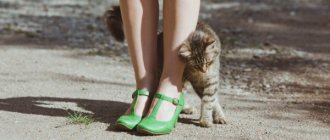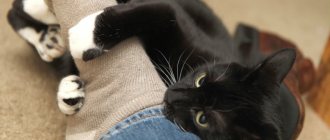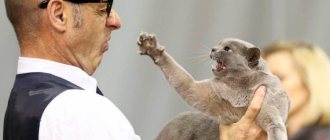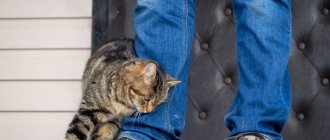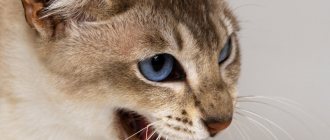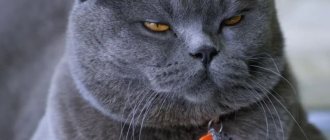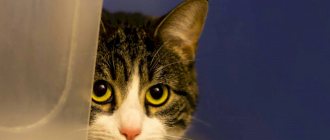Owners of domestic cats who have several pets at once often note that their pets lick each other. This behavior of cats causes emotion in humans, but the question also arises of why animals behave this way.
From a human point of view, such a manifestation of feelings means affection. Animal psychologists still have not given an exact answer why cats lick each other, because this is not only a manifestation of love, everything is much more complicated. Such licking is characteristic not only of cats, but also of monkeys, as well as wild felines.
Social connection
In 2004, a study was conducted on social interaction between stray cats. Scientists have noticed that allogrooming is typical for cats that already have established relationships with each other. “Strangers” did not show such behavior - in other words, the cats did not want to care for other animals that were unfamiliar to them, which is quite logical.
The researchers also concluded that those affected by allogrooming tend to be very friendly, purring, and tilting or turning their heads. They can expose the back of their head or the top of their head, that is, those parts of the body that are difficult to care for independently. This behavior may be motivated by a need for help regarding hygiene.
Symptoms of diseases
There are cases when licking people is a desire to draw attention to the pet’s health problems, and not a show of love or a request for affection. These may be diseases or conditions such as:
- Skin parasites, including fleas. The cat worries not only about itself, but also about the people around it, and is trying to get rid of the problem.
- Allergy. If feeding is incorrect or the food is changed, skin problems can occur, which leads to excessive licking of yourself and those around you.
- Disturbances in general health. By licking frequently, the animal tries to signal that something is wrong with it. It is important to notice changes in behavior and contact a veterinarian promptly.
- Infectious diseases. Some of them cause itching and rashes on the skin, which irritates the pet and he tries to get rid of it in this way.
Licking is associated with higher rank
Another, earlier study found that in most cases, higher-ranking cats groom lower-ranking ones. In this case, most often those animals that are licked sit or lie, while those caring for them take higher positions - standing or sitting upright. A cat, without resorting to fights and other aggressive actions, can show its dominance by licking another.
Why cats can lick each other
The domestic cat, being the ancestor of its wild relatives, represents a true standard of self-sufficiency. Cats show no interest, showing their indifference. Animals are true loners, intersecting with their relatives only when absolutely necessary. But this is only relevant for cats living far from humans. In the course of selection and evolution, domesticated cats began to show more attention to their relatives. Such a change is inherent only in the psychology of cats, getting what they want in any way.
Cats communicate with each other using various gestures, also using smells, sounds, looks and tactile contact. It is mutual licking that refers to friendly signals transmitted from animal to animal.
There are several explanations for such licking:
- Exchange of scents. By licking their relatives, cats transmit body scents. This allows you to become related, and quickly makes it possible to distinguish a stranger from your brother-in-law. The skill of licking each other is very valuable for cats living in outdoor conditions. At home, the skill is practically not needed.
- Dominance. If an owner notices their pets licking each other, this may indicate an attempt to indicate place in the hierarchy. Cats gently hint who is in charge and who needs to obey.
- Maternal feelings. The manifestation of maternal feelings occurs from a very early age, when small kittens need the affection and care of their mother cat. During this period, the mother cat monitors the cleanliness of the coat. With age, if the kittens remain with their mother, this kind of care remains for a long time.
- Marking who is yours and who is a stranger. By licking each other, cats mark their relatives. If a new pet appears in the house, cats begin to actively sniff and lick their relative. This is how a kind of acquaintance occurs.
Basically, a cat that licks pays attention to such places as the cheekbone area, the scruff of the neck and the crown of the head. In addition to getting to know each other, cats show care for each other by grooming their fur.
Prevention
- At least once every six months, undergo a full examination, this way you can identify pathologies in your pet at stages of development.
- Try not to create stressful situations for your pet. And if this cannot be done (for example, when moving, etc.), then purchase sedatives.
- Examine your cat daily so you can notice skin damage and then help your pet with recovery.
- Make a proper diet, so it is better to consult a doctor. After all, he will be able to create a diet taking into account the health characteristics of the cat.
Main reasons
Cats are one of the most independent and self-sufficient pets you can keep at home. Some people periodically feel like they are the ones living with their animal, and not the other way around, they behave so proudly. Therefore, when pets start licking their hands, many people want to think that this is only because of strong love and affection. However, this is not entirely true; there are also other reasons for this.
Expressing affection and care
This behavior is one of the main reasons for licking the head, hands, face, and hair of its owner. A cat avoids people who, for one reason or another, are unpleasant to them. This could be a smell, a neglectful or rude attitude towards an animal, and many others. Therefore, if a pet shows sympathy in this way, there is no need to scold or drive him away. This behavior will cause the animal to lose trust. When it becomes uncomfortable from prolonged licking with a rough and wet tongue, you should not drive the cat away, but divert his attention to a treat or toy.
Maternal instinct
After birth, when kittens are still blind and deaf, they communicate with their mother through tactile interactions. Cats lick their offspring many times a day. This moment remains in the memory of animals for life. When they reach puberty, but do not have kittens for one reason or another, they thus demonstrate maternal instinct. Cats begin to lick their owner, thereby replacing the care of kittens. This seems funny and cute, but this behavior should alert the owner; it can harm the health of the pet. In this connection, veterinarians recommend sterilizing animals at the age of less than 12 months, if matings are not planned in the future.
Lack of attention
When the owner does not give his pet enough attention, this is fraught with damage to furniture, torn wallpaper and loss of mutual understanding with each other. Particularly active individuals can even bite a person. There are several signs that your cat wants affection or play that should not be ignored:
- flattens ears;
- nuzzles hand;
- licks the owner's nose and face.
The pet can lie flat on the floor at the owner’s feet and turn one side or another, as if showing an area of the body where it needs to be stroked or scratched.
Many cats enjoy having their foreheads and ears scratched. Moreover, the fur on the forehead should be stroked against growth, and the ears can be pulled a little. Some pets love it if their belly is touched, others cannot stand it. During molting, animals love to be combed, which is also worth taking into account.
If, when caressed by the owner, the cat begins to purr gently, this indicates that she is happy with everything and is enjoying herself.
You can start stroking without waiting for a call from your pet, but take the initiative yourself. To do this, you need to bring your hand to a distance of about 10 cm from the animal and scratch it nearby; if it reaches out and begins to rub against the owner, then the call for affection has been accepted.
Cat dominance
When licking, sometimes a cat shows its dominant role in the family. In this way she means that this person is her property. At the same time, the pet leaves its scent on the owner. If there are no signs of aggression, there is no need to fight this, as this is normal, because it is not for nothing that everyone knows that a cat is one of the most independent pets.
Anxiety and stress
With increased anxiety and stress, a cat often begins to lick itself and its owner. If such behavior has not been noticed before, or if it was much less so, you need to show the animal to a veterinarian, because this is a symptom indicating the presence of some pathology.
Another reason for this behavior is the animal’s low self-esteem. Licking the owner is a way to win him over and keep him safe. At the same time, the pet is tense and will constantly expect a trick, rather than enjoy communicating with the owner.
Boredom
Some animals, often and for a long time being alone, try to have fun on their own. Some start eating a lot, while others start licking. This is a way to cope with boredom. First, they constantly carry out the washing procedure, and then switch to the owner’s things, as well as hair, hands, face, and the person himself. Sometimes animals go so far as to lick until the hair falls out, followed by the formation of a wound in this place that constantly gets wet. At the same time, they do not stop licking, even in such critical situations.
If this happens to pets, you need to seek veterinary help.
Naturally pungent odor from the owner
Cats have a very highly developed sense of smell, so they can lick the hands, feet, and armpits of their owners who come in the evening after work. The fact is that the smell of sweat formed on the human body during the day is a bait for animals. And by licking it, pets try to protect their owner from persecution by other animals and encroachment on their territory.
Are dog licks harmful to humans?
The muzzle area and oral cavity of animals are not sterile; they contain a large number of pathogenic microorganisms and parasite eggs. It is impossible to detect them by visual inspection. Owners of four-legged animals mistakenly believe that a pet living with them, undergoing regular treatment for helminths, fleas and ticks, regularly vaccinated, is absolutely clean, and it is impossible to get infected from it.
A dog licks its anus under its tail: why does this happen?
All dogs, even the most searched ones, go out for walks and run past garbage containers, sniffing for traces of the activity of other creatures. The owner does not always pay attention to such nuances and cannot brush his teeth or use antibacterial treatment after every walk.
If there are no abrasions or small wounds on a person’s skin, then pathogenic microflora cannot penetrate through it into the body. But this does not always protect against infection with certain types of infections. When the mucous membrane is damaged or there are microcracks in the skin, bacteria easily pass through them and penetrate into deep tissues. It is because of this that you should not allow yourself to be licked, especially around the lips or eyes.
Old people claim that dog saliva has a healing effect and, thanks to these properties, can heal wounds. Misconceptions do not mean that salivary secretion is so beneficial for the human body. In fact, it contains a large number of pathogens that, if they penetrate abrasions, can cause serious harm. In severe cases, they cause staph infection or sepsis (blood poisoning).
To exclude the possibility of infection, dog handlers recommend adhering to the following principles:
- Vaccinate and deworm your pet in a timely manner;
- when walking, sniffing of excrement, dead animals, and garbage should be prevented;
- Wash your hands regularly and wash yourself if your dog accidentally licks you to remove particles of his saliva from the skin;
- do not encourage attempts to kiss the owner or “wash” him once again.
Important! The main health hazard is kissing strangers or stray animals. It is unknown what they may be sick with. The habit of kissing your neighbor's dogs, regardless of size, can become a source of serious illness.
Regular attempts to lick and “wash” the owner with pets are caused by the expression of emotions. Devotion and fidelity are important qualities of dogs, but it is better to suppress the desire to prove their presence by learning the simplest command with your four-legged dog that prohibits “kissing” and “washing” your beloved owner.
Treatment of inflammation of the paraanal glands in cats
If your cat shows signs of problems with the anal glands, you should visit a veterinarian who can professionally help the animal by manually clearing the sinuses of stagnant secretions and carrying out appropriate antiseptic treatment.
It is permissible to use rectal suppositories with ichthyol, which are administered twice a day for a week. Synthomycin liniment or Levomekol ointment are also used for inflammation of the paraanal glands in cats.
Infectious inflammation with the formation of pus is treated with antibiotics. Veterinarians prescribe medications such as Ampicillin or Amoxicillin (amoxicillin with clavulanic acid); veterinary suspension for subcutaneous and intramuscular injections Clavil (amoxicillin + potassium clavulanate) - for five to seven days, one injection (the dose is calculated based on the body weight of the animal); Cephalen 1000 (Cephalexin) and Cephalen suspension for oral administration.
Homeopathy for animals can be used, in particular, anti-inflammatory drugs with analgesic and healing effects, such as Travmatin (in the form of an injection solution) or Travma-gel (for external use).
In the absence of the effect of conservative therapy, surgical treatment is performed as a radical remedy - removal of the paraanal sinuses. This operation is often complicated by narrowing of the rectum or fecal incontinence.
How a dog sees the world - and what do dog kisses mean
Dogs see the world completely differently than we do.
Any dog lover should accept the fact that dogs are not small, peculiar people, they are creatures that see the world completely differently than we do. This applies to both physiology and lifestyle features.
| Human | Dog |
| Cognizes the world through the organs of sight, hearing, and only then smell and touch | First smells, then hears, touches (tastes, licks), and lastly looks |
| Having smelled the smell, he will turn around and find the source with his eyes to make sure that he is not mistaken. | Doesn't trust her eyes, she rushes to sniff the object to avoid mistakes |
| Capable of obtaining a large amount of information even from a picture | A dog is not interested in an immovable and odorless object. |
How to get a dog to stop licking
Licking is another way to make sure that there is a person in front of the dog: not only the smell, but the taste of the secretions of the sweat and sebaceous glands is unique for each person. By licking the owner or family member, the dog “identifies” him.
How to break your pet's habit
When an owner is annoyed by such excessive attention from his cat, there are several ways to try to get rid of this habit:
- A game. By switching attention to entertainment and giving your pet an outlet for energy, you can relieve her for a while from the desire to lick something or someone.
- Weasel. If the problem is stress or lack of attention, you need to pet and hug the animal more often, and the problem will disappear soon.
- Change of interests. Apply a special solution – catnip – to your pet’s toys. It is sold in pet stores. Its scent will attract the cat's attention.
- Refusal. If your pet's behavior becomes overly intrusive, every time he tries to lick him, you need to gently but decisively push him away and make it clear that this is not worth doing. After some time, the method will work and the cat will stop trying.
- Substitution for another item. Buy a fur mitten and put it on your hand every time you try to lick your fingers. After time, attention will switch to the object, and the owner will no longer be needed.
It is worth remembering that such behavior of a pet can be due to a whole range of different reasons and there is no need to get angry or scold him for it. After all, with such behavior the cat does not want to cause harm, but is simply trying to attract the owner’s attention to his person or show love.
1111
Lack of necessary substances: the cat licks the owner’s ears
As strange as it may sound, some cats lick their owners' ears to get to the earwax. There is an opinion that it attracts them not by taste, but by smell. The substance produced by the sulfur glands of the external auditory canal in the ears of people is dead cells containing protein and a special odorous secretion. It reminds animals of a nutritious protein environment that they can get enough of.
The composition of earwax includes:
- proteins, some of which are immunoglobulins;
- fats;
- free fatty acids;
- mineral salts;
- dead cells;
- sebum and other inclusions, such as dirt, dust.
It is with the rich composition of sulfur that the second version is associated, explaining why the pet is trying to get to human ears. According to her, he does this due to a lack of some elements in the body. If this happened once, there is no reason to worry - it means the cat just wanted to explore an unfamiliar “object.” If he constantly crawls into a person’s ear, licks it, persistently trying to get wax, you need to reconsider his diet for missing essential substances. Perhaps the problem lies not in nutrition, but in some kind of disease, so it is better to entrust it to a veterinarian to find out its cause.
“Master, wash yourself!” – the cat doesn’t like the smell and licks the person
Cats perceive the natural body odor of the owner as familiar and familiar. They associate it with safety. Typically, representatives of the cat family perceive their owners as their property and mark them with special marks that can be felt only by them and their imaginary enemies.
The point is not only that another aroma covers the pet’s familiar body odor. The wild ancestors of modern cats tried their best not to be detected by smell by hostile predators. For them, the strong odor poses a danger of detection. Their domesticated descendants have no need to hide from enemies, but the instinct of self-preservation remains. Cats also lick their owners because they try to protect them from ill-wishers who can find them by smell.
